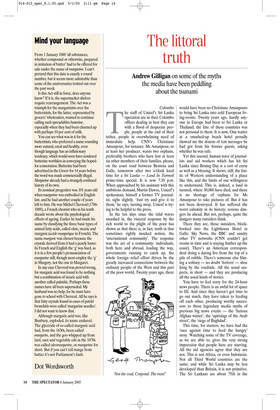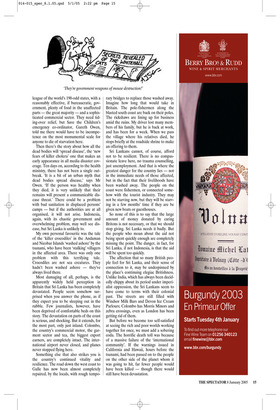The littoral truth
Andrew Gilligan on some of the myths the media have been peddling about the tsunami Colombo The staff of Unicef’s Sri Lanka operation are in their Colombo offices dealing as best they can with a flood of desperate people, people at the end of their tether, people in overwhelming need of immediate help. CNN’s Christiane Amanpour, for instance. Ms Amanpour, or at least her producer, wants two orphans, preferably brothers who have lost at least six other members of their families, please, on the coast road between Bentota and Galle, tomorrow after two o’clock local time for a Sri Lanka — Land In Turmoil prime-time special. It is now 7.30 p.m. When approached by his assistant with this ambitious demand, Martin Dawes, Unicef’s spokesman, himself a former TV journalist, sighs slightly. ‘Just try and give it to them,’ he says, turning away. Unicef is trying to be helpful to the press.
In the ten days since the tidal waves smashed in, the visceral response by the rich world to the plight of the poor has shown us that there is, in fact, truth in that sometimes rightly mocked notion, the ‘international community’. The response was the act of a community: individuals, both here and abroad, leading the way, governments running to catch up, the whole foreign relief effort driven by the greatly increased connections between the ordinary people of the West and this part of the poor world. Twenty years ago, there would have been no Christiane Amanpours to bring Sri Lanka into cold European living-rooms. Twenty years ago, hardly anyone in Europe had been to Sri Lanka or Thailand; the fate of these countries was not personal to them. It is now. One waiter at a smashed-up beach hotel proudly showed me the dozens of text messages he had got from his former guests, asking whether he was safe.
Yet this second, human wave of journalists and aid workers which has hit Sri Lanka since Boxing Day is a sort of curse as well as a blessing. It shows, still, the limits of Western understanding of a place like this, and the limits of our willingness to understand. This is, indeed, a land in turmoil, where 30,000 have died, and there is no shortage of orphans for Ms Amanpour to take pictures of. But it has not been destroyed. It has suffered the worst calamity in its history; serious dangers lie ahead. But not, perhaps, quite the dangers many outsiders think.
There they are, those outsiders, blockbooked into the Lighthouse Hotel in Galle: Sky News, the BBC and sundry other TV networks (CNN couldn’t get rooms in time and is staying further up the coast). There’s an American correspondent doing a daring live from the top of a pile of rubble. There’s someone else filming a solitary — no doubt ‘forlorn’ — shoe lying by the roadside. All the usual suspects, in short — and they are producing all the usual kinds of stories.
You have to feel sorry for the 24-hour news people. There is an awful lot of space to fill. And since they haven’t got time to go out much, they have taken to feeding off each other, producing worthy successors to those legendary media myths of previous big news events — the ‘furious Afghan winter’, the ‘uprisings of the Arab street’, the ‘siege of Baghdad’.
This time, for starters, we have had the ‘race against time to feed the hungry’ story. Watching some of the TV coverage, as we are able to, gives the very strong impression that people here are starving. All the aid agencies agree that they are not. This is not Africa, or even Indonesia. Not all Third World countries are the same; and while Sri Lanka may be less developed than Britain, it is not primitive. The Sri Lankans are about 75th in the league of the world’s 190-odd states, with a reasonably effective, if bureaucratic, government, plenty of food in the unaffected parts — the great majority — and a sophisticated commercial sector. They need tiding-over relief, but Save the Children’s emergency co-ordinator, Gareth Owen, told me there would have to be incompetence on the most monumental scale for anyone to die of starvation here.
Then there’s the story about how all the dead bodies will ‘spread disease’, the ‘new fears of killer cholera’ one that makes an early appearance in all media disaster coverage. Ten days on, according to the health ministry, there has not been a single outbreak. ‘It is a bit of an urban myth that dead bodies spread disease,’ says Mr Owen. ‘If the person was healthy when they died, it is very unlikely that their remains will present a communicable disease threat.’ There could be a problem with bad sanitation in displaced persons’ camps — but if the authorities are at all organised, it will not arise. Indonesia, again, with its chaotic government and overwhelming problem, may well see disease, but Sri Lanka is unlikely to.
My own personal favourite was the tale of the ‘killer crocodiles’ in the Andaman and Nicobar Islands ‘washed ashore’ by the tsunami, who have been ‘stalking’ villagers in the affected area. There was only one problem with this terrifying tale. Crocodiles are not sea creatures. They hadn’t been washed ashore — they’ve always lived there.
Most damaging of all, perhaps, is the apparently widely held perception in Britain that Sri Lanka has been completely devastated. People seem somehow surprised when you answer the phone, as if they expect you to be sleeping out in the rubble. Few journalists, however, have been deprived of comfortable beds on this story. The devastation on parts of the coast is serious, and shocking. But it extends, for the most part, only just inland. Colombo, the country’s commercial motor, the garment sector and tea, the biggest export earners, are completely intact. The international airport never closed, and planes never stopped flying here.
Something else that also strikes you is the country’s continued vitality and resilience. The road down the west coast to Galle has now been almost completely repaired, by the locals, with rough tempo rary bridges to replace those washed away. Imagine how long that would take in Britain. The pole-fishermen along the blasted south coast are back on their poles. The rickshaws are lining up for business amid the ruins. My driver lost many members of his family, but he is back at work, and has been for a week. When we pass the village where his relatives died, he stops briefly at the roadside shrine to make an offering to them.
Sri Lankans cannot, of course, afford not to be resilient. There is no compassionate leave here, no trauma counselling, just unemployment. And that is where the greatest danger for the country lies — not in the immediate needs of those affected, but in the fact that their livelihoods have been washed away. The people on the coast were fishermen, or connected somehow with the tourist industry. They may not be starving now, but they will be starving in a few months’ time if they are be given new boats or guesthouses.
So none of this is to say that the large amount of money donated by caring Britons is not necessary, or that we should stop giving. Sri Lanka needs it badly. But the people who moan about the aid not being spent quickly enough are completely missing the point. The danger, in fact, for Sri Lanka, if not Indonesia, is that the aid will be spent too quickly.
The affection that so many British people feel for Sri Lanka, and their sense of connection to it, may be underpinned by the place’s continuing elegiac Britishness. Unlike India, which has always been decidedly chippy about its period under imperialist oppression, the Sri Lankans seem to have come to terms with their colonial past. The streets are still filled with Windsor Milk Bars and Devon Ice Cream Parlours; Colombo has Morris Minors and zebra crossings, even as London has been getting rid of them.
But before we become too self-satisfied at seeing the rich and poor worlds working together for once, we must add a sobering coda. The horrific death toll was because of a massive failure of the ‘international community’. If the warnings issued in California and Hawaii, hours before the tsunami, had been passed on to the people on the other side of the planet whom it was going to hit, far fewer people would have been killed — though there would still have been devastation.











































 Previous page
Previous page